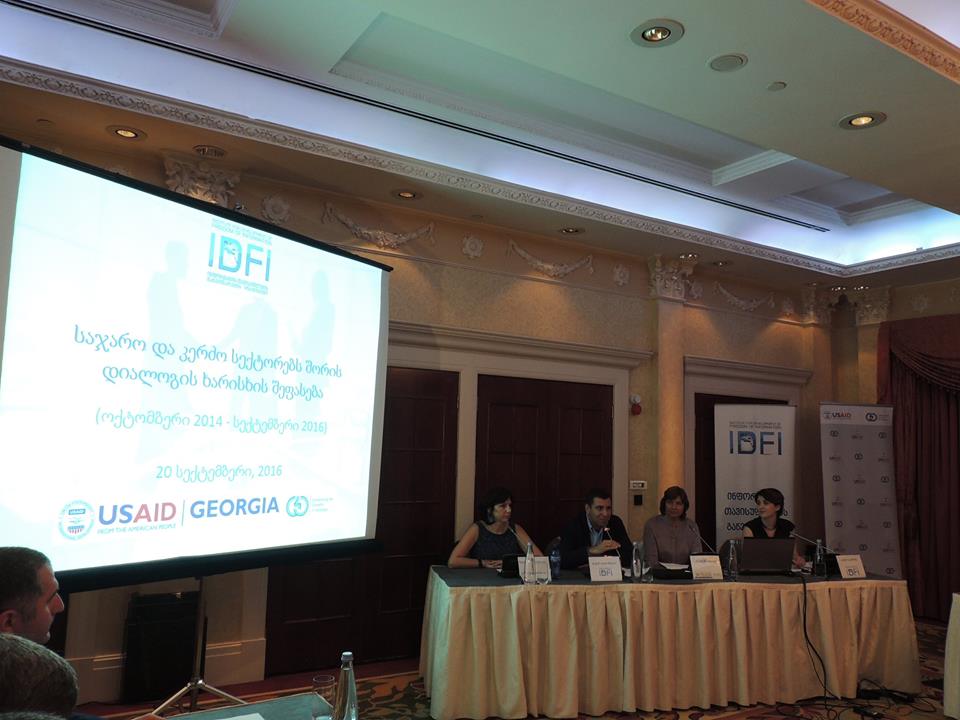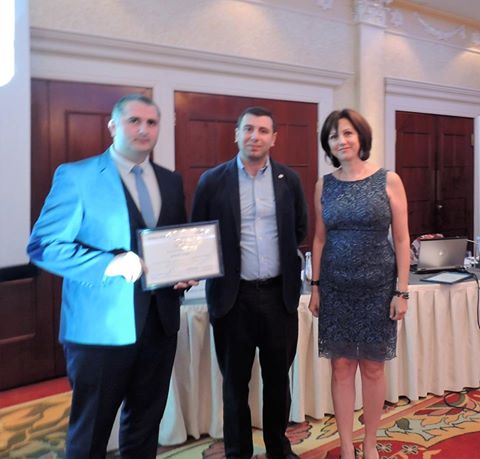


 On September 20, the Institute for Development of Freedom of Information (IDFI) held a presentation of the annual assessment report of the quality of dialogue between public and private sectors in Georgia and awarded 3 state agencies with the highest degree of private sector involvement in their draft laws: Ministry of Finance of Georgia; Innovations and Technology Agency of Georgia; and Ministry of Environment and Natural Resources of Georgia. The event was held at Hotel Tbilisi Marriott.
On September 20, the Institute for Development of Freedom of Information (IDFI) held a presentation of the annual assessment report of the quality of dialogue between public and private sectors in Georgia and awarded 3 state agencies with the highest degree of private sector involvement in their draft laws: Ministry of Finance of Georgia; Innovations and Technology Agency of Georgia; and Ministry of Environment and Natural Resources of Georgia. The event was held at Hotel Tbilisi Marriott.
The project Public-Private Dialogue (PPD) Quality Tracking in Georgia is implemented by IDFI with the financial support of the USAID program - Governing for Growth (G4G) in Georgia. The project is designed to assess the extent and quality of public sector involvement in the process of drafting legislation that has a significant economic impact.
The evaluation of the extent and quality of PPD was based on pre-identified four phases of draft law development: 1. policy design and development; 2. legislation drafting; 3. regulatory impact assessment; and 4. circulation and public comments.
In order to conduct the assessment, IDFI selected 24 draft laws that were initiated from October 1, 2014 until September 1, 2016.
The project team conducted interviews with the authors of selected draft laws using special questionnaires. The questionnaire included questions on whether information was available about the ongoing reform, the degree of involvement of all relevant stakeholders, participation in the decision-making process, the quality of feedback, etc. A second round of interviews was also conducted, depending on the information gathered during the first interview.
The results of the first annual report show that an effective dialogue between the private and public sectors in Georgia is at an early stage of development and is in need of improvement.
Key findings include:
1. In the absence of direct legal obligations for inclusive consultation on initial stages of policy formulation dialogue between the public and private sectors occurs only as an exception. This problem is especially significant in case of draft laws initiated by Members of Parliament (MPs), who showed some of the worst examples of PPD quality. 
2. Regulatory Impact Assessment (RIA) is used very rarely in Georgia as an instrument for policy development, even in the case of draft laws with substantial economic impact. In the absence of direct requirements to conduct comprehensive RIA many authors of draft laws with economic impact limit themselves with explanatory notes. However, the information given in explanatory notes is often too scarce and superficial, not supported with publicly available research and not part of wider public discussion before the draft law is officially initiated.
IDFI believes that collaboration between public and private actors is vital for economic development because an inclusive, participative, collaborative process leads to more effective policies and laws. Nevertheless, effective dialogue between private and public sectors is still a challenge in Georgia.
By revealing the most successful cases of quality PPD in Georgia IDFI hopes to emphasize the positive impact of effective consultation on early stages of policy process, and thus promote more inclusive decision-making at all stages of governance.
After the awarding ceremony, IDFI’s Estonian colleagues: Hille Hinsberg, PRAXIS Expert and Riin Savi, Head of the Traders Association presented Estonian experience of civil engagement to the representatives of Georgian Governmental and Non-Governmental organizations.